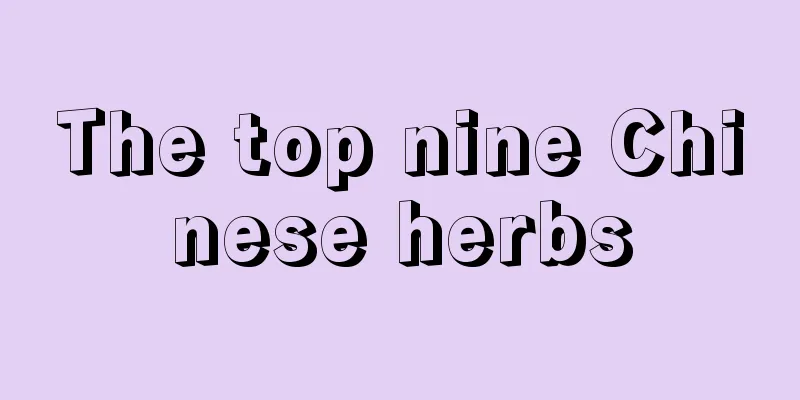The top nine Chinese herbs

First place: Dendrobium officinale"Shennong's Herbal Medicine" records that Dendrobium candidum "treats injuries, eliminates numbness, relieves gas, replenishes the five internal organs, treats emaciation, strengthens the yin, and thickens the stomach and intestines after long-term use." "Compendium of Materia Medica" states that Dendrobium officinale has the effects of "strengthening yin and benefiting essence, thickening the intestines and stomach, replenishing internal deficiencies, making the body light and prolonging life". Let me translate it for you: It is a holy product for nourishing yin. It is suitable for people with bad stomachs, excess internal heat, endocrine disorders, those who have been struggling with haze for a long time and have a heavy burden on their lungs, and those with low immunity! Maybe he will become an immortal. Second place: Tianshan Snow LotusThere is snow lotus in Tianshan Mountain, which grows in the mountains. It can dispel cold, strengthen yang, strengthen tendons and relax collaterals, and treat soreness of waist and knees. It is the best product for prolonging life. Throughout the ages, Tianshan Snow Lotus has always been a nourishing tonic that people have longed for. Third place: Three taels of ginsengAccording to traditional pharmacopoeia, ginseng can strengthen the body, protect life, and prolong life. Modern medical research has found that ginseng has complex ingredients and is not suitable for cancer patients. Remember, remember! You can’t just take supplements casually, and you can’t just eat herbal jelly casually. Also, do you know why the heavier the ginseng, the more expensive it is? Fourth place: Centennial Polygonum multiflorumDo you still remember the magical human-shaped Polygonum multiflorum described by Mr. Lu Xun? This is the baby I'm talking about. Shouwu nourishes the liver and kidneys, improves essence and blood, and strengthens the tendons and bones. Translation: If you want black hair, good teeth, no spots... and eternal youth, taking Polygonum multiflorum appropriately can prevent aging. Oh my god, it takes 100 years to become an immortal, that’s not easy! Fifth place: Sixtieth-century Poriaoh! That’s a 60-year-old grandfather-level Poria! Poria strengthens the spleen and calms the mind, treats edema, and eliminates dampness and heat. I once thought of Tong Lao when I was young. My face was full of marks of youth, and Poria cocos was included in the Chinese medicine prescription prescribed by the doctor. 6. Deep Mountain GanodermaGanoderma lucidum has been considered a symbol of good luck, wealth, beauty and longevity since ancient times, and is known as the "immortal grass" and "auspicious grass". Traditional Chinese medicine has long regarded it as a precious Chinese herbal medicine that can nourish, strengthen the body, and restore the body's health. According to folklore, Ganoderma lucidum has the power to bring the dead back to life and grant immortality. 7. Seabed PearlsThe bigger the beads are, the better. It turns out that the deeper they come from, the better! Pearls have the effects of calming the nerves, improving eyesight, removing cataracts, detoxifying and promoting tissue regeneration. Modern research also shows that pearls have unique effects in improving human immunity, delaying aging, removing spots and whitening the skin, and supplementing calcium. All right! Pearls are considered "grass"! 8. Cordyceps sinensisDidn’t expect that? This thing that is sold for hundreds of thousands of yuan per kilogram is only ranked eighth among the nine magical herbs! Cordyceps acts on the immune system like adjusting the volume to keep it at its optimal level. 9. CistancheCistanche deserticola, also known as Dayun, is mainly produced in Alxa League of Inner Mongolia Autonomous Region. Traditional Chinese medicine calls it goblin or golden bamboo shoot. It is an extremely precious Chinese medicinal material and is known as the "desert ginseng". Historically, it has been used as a treasure by various countries in the Western Regions to pay tribute to the imperial court. Cistanche has been used as medicine for a long time. It is sweet and warm in nature, salty and moist in texture. It has the characteristics of tonifying yang without being dry, warming the kidney yang and replenishing kidney deficiency; tonifying yin without being greasy, moistening the intestines and abdomen and treating constipation. Because it has tonic and soothing effects, it is called Cistanche (calmness). |
Recommend
How to make azalea bloom
1. Various environmental factors (1) Light: Altho...
What vegetables are suitable to grow in summer
What vegetables are suitable to grow in summer Th...
The efficacy and function of Prunella vulgaris
After being dried, Prunella Vulgaris is very ligh...
What to do if azalea drops leaves
1. Replace the potting soil Because it likes to g...
First Love Summer Maintenance Method
Summer care for first love: light First Love like...
High-yield and high-quality cultivation techniques of chili pepper
The Chaotian pepper is a famous pepper variety, a...
Apple tree management techniques in January
It is January now, and it is still a cold winter....
How to fertilize Shuangxi vine
1. The demand for fertilizer of Shuangxi Teng Whe...
How many years can I grow colored calla lilies? Do they like sunlight?
1. Do you like sunshine? Colored calla lily likes...
When is the best time to sow sesame?
Sesame , as an oil-rich crop, is favored in many ...
What should I do if the leaves of the weeping angel have become soft?
1. Reasonable exposure to light The weeping angel...
Do camellias need pruning?
1. Is it necessary? Yes, because the plant will g...
How to breed Luanfeng Jade
Seed propagation of Luanfengyu Seeding propagatio...
Is the cherry yield high? What is the yield per mu?
Is the cherry yield high? The yield of cherries i...
How to raise fire festival in summer
1. Summer maintenance methods 1. Sunlight: Fire P...









